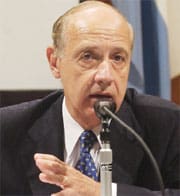Argentinas default and subsequent meager settlement for creditors will change forever the rules for emerging market investors. Raising funds will likely get much more difficult.

Giullermo Nielsen is wearing a big smile these daysas well he might. On Friday, May 13, the Argentine finance minister got the news he wanted: A New York court had thrown out an action by a small group of hedge funds seeking to impound $7 billion of defaulted Argentine eurobonds. The ruling removed the last legal hurdle to a debt swap launched 19 months earlieran exercise crucial in Nielsens eyes to his governments efforts to put the Argentine economy back on its feet after its plunge into economic disaster and, in December 2001, default.
That debt swap was breathtaking in its scope and unprecedented in its implementation. Throwing convention to the winds, the Argentine government played hardball with investors, eventually offering them just $0.35 on the dollar. The government also defied pressure from the international financial community, including the International Monetary Fund, to cut a better deal for investors. In pushing through the swap against those odds, the Argentine government might just have changed forever the rules of the game when players ponder what to do when nations go bust.
Other countries are certainly going to look at Argentina and ask, Why cant I do that, too? says one emerging markets investor who holds defaulted bonds. Thats certainly what Argentina itself wants. We believe we are in a most valuable position to share our experience with other emerging sovereigns and with the international community at large, says finance minister Nielsen. We have firsthand knowledge of the effects of an economic meltdown, of a default and the problems associated with the restructuring of so immense a debt, while keeping current almost half of our public debt.
Its this that is giving the sweats to the people concerned with maintaining the international financial order: If Argentina can successfully push through a restructuring, it might result in higher prices for lending to emerging market countries and ultimately to disruption in flows to capital-hungry regions.
As more and more investors take emerging market debt into their mutual funds or pension plans, those flowsalready substantialare growing steadily. Washington-based think tank the Institute for International Finance forecasts that $311 billion of emerging market bonds will be issued in 2005, up from $303 billion last year and $208 billion in 2003.
Calls Grow for Global Debtors Court

|
|
|
Set against the advocates of the SDRM are most of Wall Street and the countries that borrow from emerging markets investors. They view the SDRM as clumsy and unworkable. Worse, making a default easier to sort out might make it more appealing for countries to go bust in the first place. Politics is in the mix, too. Many emerging markets sovereigns privately argue that if the IMF is a rich mans club, then any court it administers will inevitably dispense one-sided justice.
The SDRM is the brainchild of Anne Krueger, the ferociously bright first deputy managing director of the IMF. Like her (intermittent) backers in the US treasury, Krueger views the SDRM as a sovereign version of Chapter 11the US bankruptcy provisions that allow companies to restructure their debt in an orderly, court-administered process and then move on to a new life.
For a while, back in 2002, it looked as if the SDRM was set to move off the drawing board. The IMFs key policy making forum, the international monetary and financial committee, endorsed the proposals. But a fierce fightback by opponents has meant that the SDRMs proponents have yet to garner the necessary 85% of votes within the IMF. That doesnt mean the proposals are dead. At the IMF spring meetings this year officials attempted to craft a set of principles that would create a broader consensus around the SDRM. Indeed, some observers argue that the nature of the Argentine debt swap may have reinvigorated proponents of the SDRM by swinging some doubters behind the proposal. It would be ironic if the Argentine restructuring gave renewed momentum to the SDRM proposals, says Lee Buchheit, a partner at law firm Cleary Gottlieb Steen & Hamilton and a veteran of sovereign debt restructurings.
But if the Argentinean restructuring has changed the nature of the debate, many of the positions on the SDRM remain as entrenched as before. We fought tooth and nail against that idea before, says Francisco Gil Diaz, finance minister of Mexico, and if it re-emerges, we will fight tooth and nail against it again.

|
|
|
More than 90% of Uruguays bondholders voted for the exchange, compared to 76% in the Argentine case. Corralling enough voters to force out refusniks is key to the success of any market-based restructuring. That has been complicated by the changing nature of capital flows in emerging markets. In the past, a small number of banks lent large amounts of money to countries. When those borrowers got into troublewhich they all-too-frequently didall the creditors could sit around one table to hammer things out.
Now, a countrys creditors are likely to be spread across the globe and to come in all shapes and sizes. Argentinas bondholders included tens of thousands of retail investors in Germany and Italy, mutual fund managers andincreasingly, as financial Armageddon loomed nearervulture funds. These funds buy distressed debt, build up blocking stakes and resort to the courts in the hope that they will be bought out at a premium to ensure the restructuring goes through. In the mid-1990s, Elliot Associates, a fund linked to one of the litigants in the Argentine case, forced Peru to pay $58 million for a stake for which it had paid just $11 million.
Even without vulture funds on the scene, marshaling enough votes for a market-based restructuring can be tricky. Critics say the 76% by value of bondholders who said yes to the Argentina offer was low compared to similar exchanges. Argentina may, in fact, be closer to developing norms than it seems. Just look at collective action clauses (CACs), the provisions increasingly written into sovereign eurobonds. These explicitly allow for the bonds to be restructured, provided a fixed percentage of holders agree. That figure is typically set at between 75% and 85%, with the lower figure rapidly becoming the benchmark.

|
|
|
For now, Gil Diaz and his compatriots are hoping to steer a middle way between the confrontational approach of the Argentines and the legalistic bent of the IMF. That is why they have seized on the market-friendly proposals of the Institute for International Finance. Launched at the IMF spring meeting in March this year, they state that creditors and borrowers should be guided in restructurings by the following principles: transparency, cooperation, good faith and fair treatment.
The agreement on the new principles is important, said IIF chairman and Deutsche Bank CEO Josef Ackermann, launching the report. Repeatedly in the past decade there have been crises that could have been avoided, jobs destroyed that could have been preserved and debt restructurings that could have been more orderly.
Cant Pay, Wont Pay: When a Country Defaults on Debt

|
|
|
Buyers who accepted the offer from the one-time darling of the international market received just $0.35 on the dollarhalf the going rate for similar distressed-debt workouts. Whats more, as part of the deal, they had to extend their IOUs to 42 yearsan almost unimaginable maturity in a continent where no large government has ever paid back a 30-year bond. The perfect crime of debt repudiation, with no consequences, is how Christian Stracke, an analyst with New York-based credit research company CreditSights, describes it.
Argentine President Nestor Kirchner sees things very differently, of course. For the populist left-winger, the bond swap has allowed his country to shave the debt load to a level where it wont squash the countrys faltering fightback from the perfect storm of devaluation, shuttered factories and torched pocket-books that swept Argentine citizens off their feet in the first years of the 21st century.
The Argentine government has played a skillful hand, say observers. First, it shunned deals with overseas creditors, relying instead on a domestic debt splurge that stuffed hometown pension funds and insurance companies with peso-denominated debt. Many bond buyers couldnt stand the pain and sold their securities at dime-store prices. And when the government offered a bond exchange in January this year, saying its this-or-nothing, most of the rest submitted. The Argentine treasury says 76% of buyers had signed up for the offer. As for the rest, they had missed the boat, according to the Argentines.
Some of the highest-profile holdouts included vulture funds such as NML Capitaleasy hate figures in todays Latin America. But banks had sold barrow-loads of Argentine bonds to mom-and-pop savers in Germany and Italy, too. These two countries are members of the G7 group of leading industrialized economies and key shareholders at the IMF. Its the IMF that investors are pinning their hopes on; Argentina soon has to roll over $15 billion of loans advanced by the multilateral lender, a lever the IMF may yet pull to nudge the government into a deal with the stand-firm investors.
That hope may prove illusory: The government is forbidden by law from re-opening negotiations on the debt, while Argentinas economy minister, Roberto Lavagna, says that in any event the country could not afford to pay more.
But if the IMF does decide to play hardball, it may turn out that Argentina cant afford to not to cut a deal. Rising economic activity is pushing production up against capacity, stoking inflation. The country urgently needs investment in roads, power plants and new production lines. The bulk of that can only come from abroad.
Thats unlikely to be forthcoming anytime soon: Argentina is already locked in a bitter dispute with overseas power providers over government-imposed rate capping since the 2001 crisis. That has played well to the countrys hard-pressed citizens, as has the tough stance with overseas financiers. But if the lights start going out, Argentina may discover that treating investors badly might produce short-term gains but also leads to long-term pain.
IMF: MIA. How the Global Institution Stumbled Into Controversy

|
|
|
It used to be so much simpler. When a country got into trouble with its debt, the IMF stepped in, lent money and negotiated a recovery regime. No longer. Now that countries have started to actually default on their debt, the role of the Washington-based institutiona key part of the post-World War 2 Bretton Woods financial architectureis coming under scrutiny as never before. The IMF has become part of the problem and not the solution, says Carlos Nesteri, financial agent for the government of Uruguay. Its not just that its proposals for a centralized, standardized sovereign debt workout mechanism are wrongheaded in the eyes of its critics (see main story). Its not just that it necessarily acts in the interests of its main shareholders, the Western industrialized countries.
Its dual role as both lender and adviser to distressed countries compromises it, say observers. J.D. Buetikofer, an emerging markets portfolio manager at Julius Baer Asset Management, who has so far refused to swap the defaulted Argentine bonds he holds, believes the IMF is suffering a deep conflict of interest. That conflict of interest is irking investors even more than usual in the Argentine case. Paul Blustein, author of And The Money Kept Rolling In: Wall Street, the IMF and the Bankrupting of Argentina, points out that with its officials paying more than 50 visits in recent years to Argentina, the IMF was a key player in the policy missteps that led the country into economic meltdown. Yet, unlike other creditors, it took no haircut on its loans.
Critics say those wrong calls continued even after Argentina first announced the initial terms of the restructuring. Typically, when a country is in need of a debt workout, the IMF works with the financial management team of that country to establish what level of primary fiscal surplus the treasury can run. That free cashflow effectively determines what level of debt the country can serviceand so acts as a proxy for a fair recovery value for creditors.
The IMF signally failed to perform that role this time. Missing in action is how one debt restructuring expert describes the IMFs role. Others say that the IMFs inaction reflects the ambiguity felt toward the Kirchner government by the US treasury, the key shareholder in the IMF.
The IMF, of course, argues that it cant set fair value in a market-based restructuring it doesnt agree with. Still, there is little doubt that the mixed signals sent out by the IMF in the Argentine episode has further eroded its standing in emerging markets.
Mark Lehane



